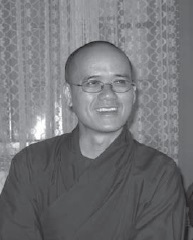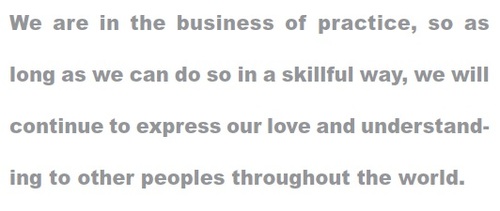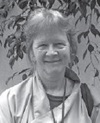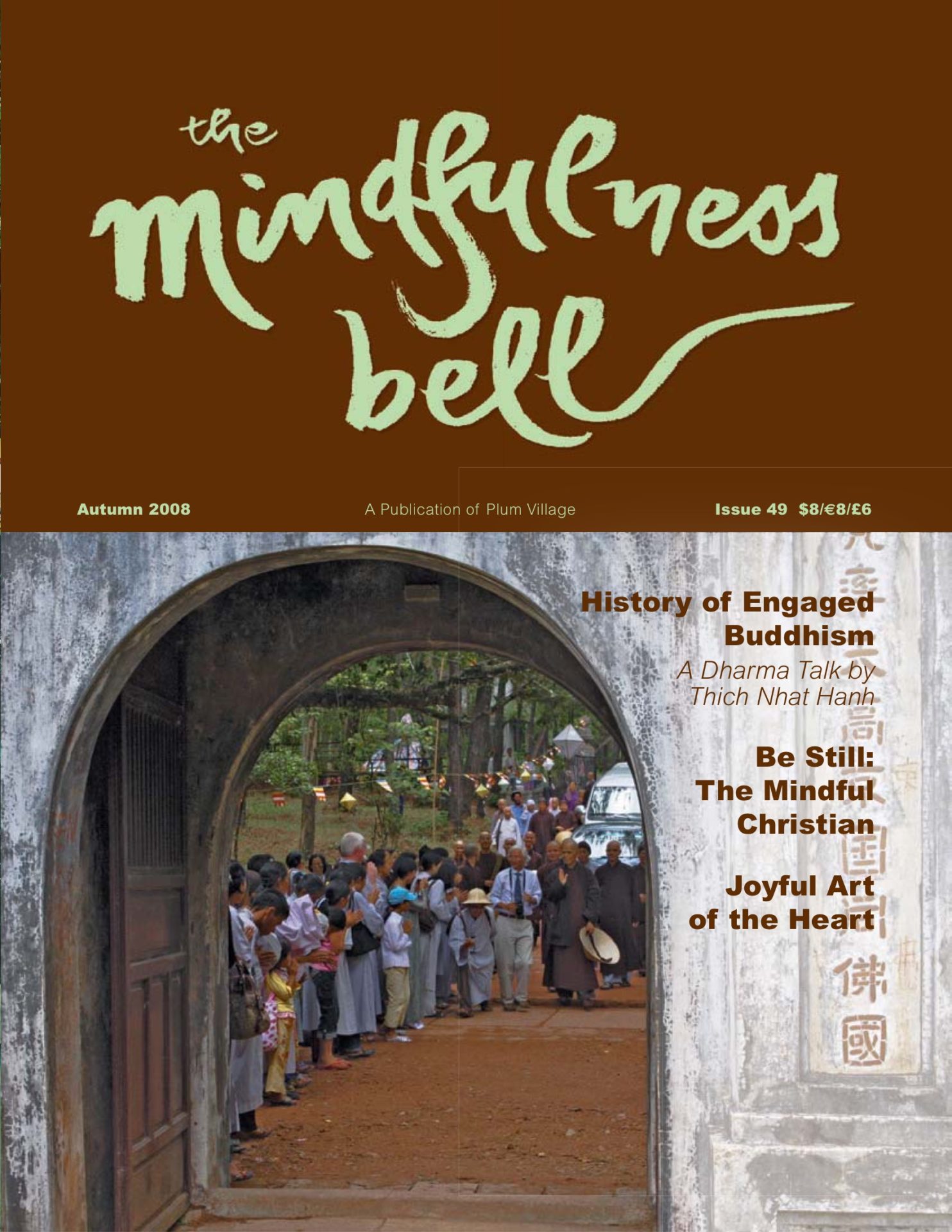Interview with Thay Phap Kham
By Barbara Casey in Hanoi, Vietnam

During the retreat in Hanoi, former Mindfulness Bell editor Barbara Casey sat down with Thay Phap Kham (monks who have received full ordination are addressed as “Thay”) for an extended chat. This energetic and committed monk has been instrumental in establishing Thich Nhat Hanh’s Sangha in Vietnam and Hong Kong. He’s also a longtime friend and supporter of the Mindfulness Bell.
Interview with Thay Phap Kham
By Barbara Casey in Hanoi, Vietnam

During the retreat in Hanoi, former Mindfulness Bell editor Barbara Casey sat down with Thay Phap Kham (monks who have received full ordination are addressed as “Thay”) for an extended chat. This energetic and committed monk has been instrumental in establishing Thich Nhat Hanh’s Sangha in Vietnam and Hong Kong. He’s also a longtime friend and supporter of the Mindfulness Bell.
Please tell us your story about being born in Vietnam, about leaving, and then what it was like coming back for the first time.
I was born in a small village in the country, in the middle of a war zone. In the daytime it was controlled by the South Vietnam government, but at night it was under the control of the guerrillas, and at times they would take people away and terrorize them. When I was five or six years old, I saw the consequences of war. My neighbors were killed. I saw people being mutilated and burned like charcoal. I saw soldiers on both sides getting killed. Some of the guerrillas who were killed were acquaintances of my family in the village. As a small child, witnessing those kinds of things made me suffer. And a deep understanding grew in me, that there should be a better way, that something like this shouldn’t happen.
I remember vividly the image of a black GI who came to my village in a convoy. I wasn’t afraid of him; he gave me some candy. But a soldier from the South Vietnamese army told me to go home because there was some fighting about to happen. So, even at that young age I had some kind of human connection with those soldiers.
When I was eleven, my hometown was taken over by the North Vietnamese army, so I moved to central Vietnam, and then to Saigon, with my family. I lived with the communists for three years [after reunification in 1975], and then I left by boat in 1978. From a refugee camp in the Philippines I emigrated to the U.S. in 1979.
Those three years under the communists taught me a lot. I became a responsible young man. And then I left Vietnam with my mother and my five brothers and sisters. After emigrating, I attended the university and graduated, and then worked as an engineer for about thirteen years.
Where was this?
Near Washington D.C. When I was twenty-five I discovered Buddhism through reading Thay’s book The Miracle of Mindfulness. It explained Buddhism to me as a way of practice, not as worship or religion. In 1987 I went to Plum Village because I wanted to come back to my cultural roots. I thought Plum Village was a place where many Vietnamese people came and participated in cultural activities, and spoke Vietnamese, and wore traditional clothes, and felt nostalgia for their homeland.
But as Plum Village developed into more of a Buddhist meditation center, I grew with that. Ten years later, in 1997, I came to practice as an aspirant. In 1998 I became a monk, so I have been a monk for about ten years. People who knew me at that time were very surprised to see me as a monk, because they saw that I was already very happy. For ten years I had been a community activist working with Vietnamese youth, teaching them about Vietnamese culture, language, and traditions. I taught Vietnamese language to the children almost every weekend. It was a way for me to serve.
But being a monk I can serve more people all over the world. So I told those people that being a monk makes me happier!
I see that the direction of my life was determined when I was very young. I was sent to a boarding school, and this had a big impact on my life. Almost every month I was allowed to go home from the school in Hue to Quang Tri where my family lived. My father would come pick me up. One day the bridge on the road was broken, because of the floods and the fighting, and my parents were on the other side and I on this side. It’s something I consider very heroic for me, an eight-year-old boy! So I crossed that broken bridge alone, and when I saw my parents, they hugged me and gave me popcorn; I felt a lot of joy!
After that trip, every night before going to bed at the boarding school I dressed up in nice clothes, and I prayed. I would pray, “Dear God, dear Buddha, and dear Jesus Christ, let me be with my family.” I did not know who had the supreme power, so I prayed to them all. But I didn’t want to be selfish, so I said, “Let all the people have a chance to be with their families also, and let the war end.”
I did that for one year. But of course it didn’t happen. The war still went on, so I stopped praying.
So you live in Vietnam again.
Yeah. Returning to Vietnam gave me a lot of experiences. I was born in Quang Tri, the place that suffered from the heaviest fighting. Just in front of my house, there was this place called Old Citadel, where the armies from the North and the South fought many fierce battles. During the two months of a last battle there in 1972, tens of thousands of people were killed or wounded. When I returned to Vietnam, I visited that place three times and contemplated — they say that every square foot of it is covered with blood. But now it has become a beautiful park. I see that people have good intentions, and it was a relief to see that local people made peace with it.

I’m happy to be back in Vietnam, but also disappointed with the morality and the values of the society now. Before we went to war and during the war, people were taking care of each other. But now, even though we have peace, it seems like people don’t take care of each other.
Vietnam has grown and developed, but if you look deeply there are many poor people, and the gap between the rich and the poor is getting bigger. This has happened in many developed countries, but it should not have happened that way in Vietnam. Also, people have lost their family values. We can see more buildings, more high rises, but if you look carefully, we see that life is difficult for people here. It’s congested and polluted. The people and the country have a long way to go to become a more developed, a more ordered society.
So I’m happy to be back, but I also see a challenge. I think that’s why Thay has made three trips back—to help, to give a hand in this process.
I have met quite a few young people at our retreats and I see their hope and also their disappointment. Having nothing to look forward to, it seems like there are no opportunities for them. In Vietnam I see that Buddhism can offer some hope, some way out.
What is Thay’s Sangha like in the different parts of Vietnam?
Since the trip in 2005, we have set up the practice in Prajna Monastery (in the highlands) and in Tu Hieu, Thay’s root temple [in central Vietnam], and we now have about four hundred monks, nuns, and aspirants who practice in our tradition. The average age is about twenty-two, very young, so they are creating a base of Buddhism for the next fifty years. Prajna is located in a remote area, but whatever we do at Prajna, people all over the country pay attention to it. Prajna is the place that people can think about and know that there is a group of people practicing for them. It gives them hope.
We have plans to expand our practice in the north. The people in the north have just returned to Buddhism after years of absence, and their practice consists mostly of faith and religious rituals. But they seem like they’re very open to our way of practice. It’s up to us to integrate their worship of Buddha with our practice. If we are skillful, we can make a big difference in the north.
There are already many temples in the north, and Plum Village doesn’t need to own a center in order to teach. We would like to be treated as a partner and be invited to teach in the temples that already exist. That makes people more secure and they’re more willing to help that way. We have to integrate with them and offer the practice so that we can spread the teaching. There are eighty-four million people, so five hundred Plum Village monastics cannot do the work alone. We need to have interbeing with other traditions, working together as a team.
We cannot be caught within the form of Plum Village traditions, of Thay’s teachings. It is the content of the practice—love and understanding—that counts.
Our presence in Hong Kong is also a support for Vietnam. The practice there is attracting quite a few people. Like everywhere else, people throughout Asia have suffered with the fast pace of modern life. If the help is there, they come. So we have a very positive outlook.
However, we need to really be careful not to over expand. We need our practice to be strong, to emphasize quality over quantity. Looking back, I think we have made quite big leaps.
What’s your relationship with the government at this point?
I think the Vietnamese government is more open, but being a communist country, they are afraid of some movement becoming too popular. They don’t want anybody to have so much influence. But they are fairly open to Thay’s teachings; for example, now most of Thay’s books have been published in Vietnam. But to spread more into the mainstream to professionals, to people who don’t come to temple regularly, we may have difficulty. We have not been able to go to schools or businesses to share the practice. We need to make the teachings available in other places besides the temple. So we have to think of ways to propagate the Dharma. For instance, people can go online to download a Dharma talk or read articles written for mainstream magazines.
As long as they don’t see us as a threat, the government will allow, maybe even encourage us to spread the teachings. We have to follow the rules, but I don’t think that we are forced to spread the propaganda of communism.
However, there are still political sensitivities. The government asked Thay and the Sangha to refrain from talking about Tibet and Burma, because these are sensitive issues. But we are in the business of practice, so as long as we can do so in a skillful way, we will continue to express our love and understanding to other peoples throughout the world.
Do you think the government sees a benefit to society in Thay’s teaching?
I think so. We have more difficulties with some segments in the Buddhist church in Vietnam than with the government, primarily due to jealousy. I think that by teaching people about moral values, we’ll help build the country. We have to do a lot more and see that this process must continue beyond our lifetimes. But at least Thay has come home and started the process. We have to find skillful ways to continue.
How can people in North America, Europe, Australia, and South America support the efforts of the Sangha in Vietnam?
The practice of other people from different parts of the world helps. On this trip, people have come from forty countries and the peaceful energy generated has impressed people already. Vietnamese people see this and say, These people are from the developed world, and they come from far away to learn the practice with this Vietnamese monk, and we are here in Vietnam, and he’s a Vietnamese man, why don’t we learn from him?
The staff in the hotel have already commented on how quiet, well behaved, and nice to be with we are. And that’s the best Dharma talk that we can give them. People who serve us in the dining hall or at the reception desk, or people doing the room service, notice the difference in a practitioner. I think being where we are, being good practitioners, is the best way to help the practice in Vietnam.
In the next twenty years Asia will be the center of attention, with the big growth in India and China and other countries. So it is good that we are beginning to take root here at this time. But we do not give less attention in the West, because that is where innovations and ideas and support will come from. Financially, Prajna is supported by the Western practitioners; Plum Village is responsible for one-hundred percent of operations and training. By going to retreats, contributing to this and that, practitioners all over the world are supporting our efforts here. That’s interbeing.
Being stronger in the West helps our practice to be strong in Vietnam. And by being stronger in Vietnam it helps us be strong in the West. From the beginning we have sent monks and nuns to Plum Village, from Prajna. And several of us from Plum Village have lived here in Vietnam.
Tell us about the online interview Thay did recently.
Thay gave an interview with an online newspaper, Vietnam Net [http://vietnamnet.vn and http://english.vietnamnet.vn]. It is one of the most visited websites in Vietnam. Quite a few people read it.
The interview lasted for almost two hours, and the interviewer asked quite a few questions — about how the teachings can help people live more moral lives, how the Buddhist values of happiness, stillness, and slowness contradict the ambition to be successful. How we can overcome jealousies among the monastics in the Buddhist church. How Buddhism can advise what a smaller Buddhist country should say to a bigger Buddhist country who always has the intention of invading [China]. He asked quite a few questions about how to apply Buddhism in real life; for example, how can his company practice as a Sangha? And Thay responded to all those questions, giving a Dharma talk to the whole nation.
Do you have any idea how many people might listen to that interview?
They say that it got one million hits. Perhaps several hundred thousand people really listened to it.
So censorship doesn’t seem to be too much of an issue?
Now it’s not an issue, because they already know Thay, so they’re quite comfortable!
Well, good! That’s a lot of penetration.
Yeah. And they transcribed the whole interview, and put the video on the Web so Vietnamese people all over the world can listen to it.
I am optimistic. There are still some hurdles — I’m still not able to get a long-term visa to stay in Vietnam. Every six months I have to renew, at the government’s mercy. But I have been here almost three years, with some break in between. The path is wide open. I am happy being a monk, so it’s the path for me.
Transcribed by Greg Sever.

Barbara Casey, True Spiritual Communication, lives in Ashland, Oregon with her husband, Robert, and practices with the Peaceful Refuge Sangha.

